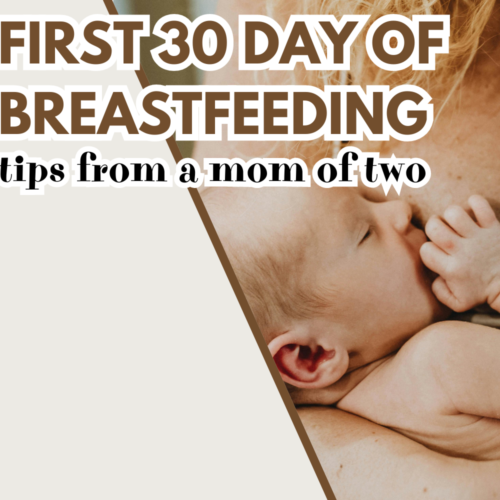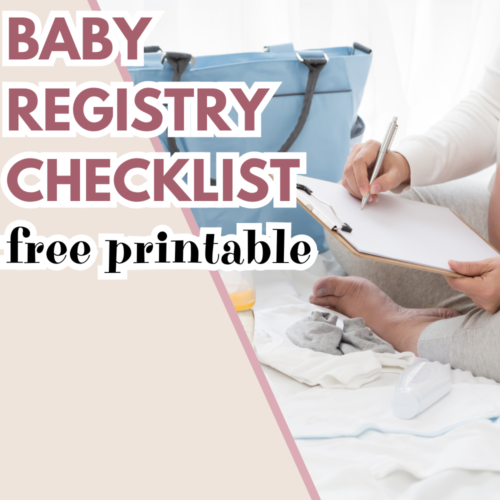The first 30 days with a newborn are pivotal, shaping the early bond between parents and baby and setting the foundation for the child’s development. This period is a blend of joy, challenges, and immense learning for new parents, as they navigate feeding, sleeping patterns, and the many firsts of their baby’s life.
As a mother of two, I’ve experienced these early days twice, each time unique. My journey with my three-year-old daughter and my three-month-old son taught me that while the core of newborn care remains the same, each child’s individual needs and personality shine through from the very beginning. This introduction to parenthood is a profound period of adaptation and growth, filled with both universal and unique moments that bind a family together. Let’s dive into the essentials of navigating this special time, informed by personal insights and professional advice.
Some of the links in this post are affiliate links, meaning I may earn a commission if you click through and make a purchase. This helps support the blog at no additional cost to you. Thank you for your support!
Table of Contents
Understanding Baby Needs: A Quick Guide for New Parents
Feeding
Newborns typically feed every 2-3 hours. Recognizing signs of hunger, like fussing or sucking on fingers, is crucial. For breastfeeding, I found a reliable breast pump and soothing nipple cream invaluable for maintaining supply and comfort.
For formula feeding, choosing the right bottles is essential. I recommend bottles that are easy to clean and designed to reduce colic, such as this starter set. These tools greatly simplified my feeding routine, making those early weeks a bit easier for both me and my baby.

You may also like: The First Month of Breastfeeding: Tales and Tips From a Mom of Two
Sleep Patterns
Newborns haven’t yet developed a clear day-night sleep cycle, often sleeping in short bursts throughout the 24-hour day. This can lead to a day-night reversal, where they’re more awake at night. To help us manage and monitor sleep patterns more effectively, we used a reliable baby monitor which allowed us to keep an eye on our little one from another room.
Establishing a soothing bedtime routine can also make a big difference. We found that swaddle blankets, a white noise machine, and blackout curtains were essential in creating an ideal sleep environment.
Creating a comfortable atmosphere for your newborn can significantly enhance their sleep quality—and yours!

You may also like: Creating a Safe Sleep Enviroument For Your Newborn Baby
Diaper Duty
Expect to change your newborn’s diaper around 10 times a day. The right supplies not only make this task easier but can also enhance your baby’s comfort. I found this brand of diapers to be exceptionally reliable, and using a subscription service helped us keep well-stocked without last-minute runs to the store.
A good changing pad and diaper bin are essentials for a functional changing station. This changing pad we used contours comfortably to keep baby safe, while this odor-controlling diaper bin was a lifesaver in keeping the nursery smelling fresh. Having everything you need within arm’s reach, from diapers to wipes to creams, simplifies the process and makes diaper changes as smooth as possible.

Soothing Techniques
Swaddling, rocking, and white noise are lifesavers for a crying baby. Each of my children had a different preference; my daughter calmed down with swaddling, while my son needed gentle rocking. Experiment to find what works best for your baby. Don’t get discouraged if it takes time to discover the right technique.

Bonding Time
The importance of skin-to-skin contact can’t be overstated. It fosters emotional connections and can even help regulate your newborn’s heartbeat and temperature. Cherish these early bonding moments. For me, the quiet minutes spent holding my babies before bedtime are unforgettable. Establish your own bonding rituals; they’re the memories you’ll treasure forever.
Remember, every baby is unique, and what works for one may not work for another. Trust your instincts, and don’t hesitate to reach out for support when needed.
Health and Development: Navigating the First Month with Your Newborn
Pediatric Visits
The first month is packed with pediatric check-ups to monitor your newborn’s health and growth. These appointments are crucial for early detection of potential health issues. Our first visit was nerve-wracking, filled with questions and concerns about feeding and sleep. Our pediatrician provided invaluable guidance and reassurance, making us feel supported in our new roles. Don’t hesitate to bring a list of questions to these visits; they’re there to help you navigate this new journey.

Developmental Milestones
In the first month, key milestones include responses to sounds, blinking at bright lights, and moving their arms and legs. It was fascinating to watch my son’s instinctive grasp reflex or how my daughter would startle in her sleep. Each small development felt like a significant victory. Remember, while milestones are guidelines, every child grows at their own pace. Enjoy these early signs of growth, and don’t worry if your baby takes a little longer to show certain behaviors.
Common Concerns
Newborns commonly face issues like jaundice, colic, and cradle cap. Jaundice, which causes yellowing of the skin and eyes, is typically mild but requires monitoring. Colic, characterized by prolonged crying, can be distressing, but it’s important to remember it’s a phase that will pass. Cradle cap appears as crusty or oily scaly patches on the scalp but is generally harmless. My daughter had mild jaundice, which resolved with some additional sunlight exposure as advised by our doctor. For any concerns, consult your pediatrician to determine if treatment is needed.
In dealing with these common concerns, patience and communication with your healthcare provider are key. Always trust your instincts—if something doesn’t feel right, seek medical advice. These early challenges are just part of the incredible journey of parenthood.
Self-Care for New Parents: Finding Balance in the Chaos
Finding Support
The saying “It takes a village to raise a child” rings especially true in the early days with a newborn. Leaning on family, friends, and parent groups can provide a lifeline during this transformative time. For me, joining a local new parents’ group was a game-changer. It not only offered practical advice but also emotional support from those going through similar experiences. Don’t be shy to ask for help or accept offers of assistance, whether it’s for babysitting, meal preparation, or just having someone to talk to.
Managing Expectations
Adjusting to life with a newborn also means recalibrating your expectations of postpartum recovery and parenting. The recovery process is not just physical but emotional too. I was surprised by how long it took to feel “normal” again after my first child was born. It was a period filled with joy, exhaustion, and everything in between. Accepting that it’s okay to not have all the answers and that it’s normal to feel overwhelmed at times helped me to be more patient with myself. Remember, taking care of yourself is not selfish—it’s necessary. Rest when you can, and don’t hesitate to share your feelings with loved ones or a professional if you’re struggling.
You may also like: Finding You Balance With a Newborn Baby: Postpartum Mental Health
Embracing the chaos, finding moments for self-care, and setting realistic expectations for yourself and your partner can significantly impact your well-being and overall experience as a new parent.
Conclusion: Navigating the First Days with Your Newborn
The initial 30 days with your newborn are a blend of learning, adapting, and immense love. We’ve touched on the critical aspects of newborn care, including feeding, sleeping, diapering, soothing, and bonding. Remember, your instincts are powerful guides in understanding your baby’s needs. When challenges arise, don’t hesitate to seek support from professionals, fellow parents, or your community.
Despite the inevitable challenges, these early days are filled with rewarding milestones—each smile, peaceful sleep, and bonding moment is a treasure. To all new parents, you’re embarking on an extraordinary journey. It’s a time of growth for both you and your baby, filled with joy and love. Stand together in this journey, embracing each day with hope and solidarity. The first month might be tough, but it’s incredibly rewarding, setting the stage for a lifelong adventure.




[…] You may also like: First 30 Days With Baby: Tips For New Parents […]